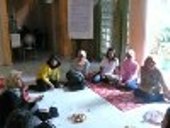-
Advocacy Theme
-
Tags
- Abortion
- Adoption
- Caregiving
- CEDAW
- Disability
- Domestic Violence
- Domestic Workers
- Harassment
- Healthcare
- Housing
- International/Regional Work
- Maintenance
- Media
- Migrant Spouses
- Migrant Workers
- Muslim Law
- National budget
- Parental Leave
- Parenthood
- Polygamy
- Population
- Race and religion
- Sexual Violence
- Sexuality Education
- Single Parents
- Social Support
- Sterilisation
- Women's Charter
Fighting Diskriminasi in South Sulawesi
March 22nd, 2011 | Gender-based Violence, Muslim Women's Rights, News, Views
 This piece has been modified for length by the author from its original version on cedaw-seasia.org, a website about CEDAW (Convention on the Elimination of Discrimination Against Women) by UN Women.
This piece has been modified for length by the author from its original version on cedaw-seasia.org, a website about CEDAW (Convention on the Elimination of Discrimination Against Women) by UN Women.
Eight women sit cross-legged on straw mats in a circle talking animatedly while they drink tea and munch on sweets. The women are in Makassar, the capital of South Sulawesi, and they belong to an NGO network called Forum Pemerhati Masalah Perempuan (FPMP, or Forum Concerning Women’s Problems). South Sulawesi is one of Indonesia’s larger provinces, and the FPMP members are discussing cases of diskriminasi taking place in a village in the next district.
Word is, that one village in Bulukumba, has begun enforcing new regulations that impose a strict dress code on women. The new rules require that all women must abide by traditional Islamic dress, and wear the jilbab or headscarf if they want access to public services, including healthcare. The eight have heard that in Bulukumba, women are actually being turned away from clinics by officials. Girls, even as young as six or seven, must also don the jilbab if they want to attend school.
“As Muslim women, the jilbab that we wear is a matter of choice,” said Hajar, one of the FPMP women who herself wears the headscarf. “If local laws are going to force all women to wear this, then this is going against our right to choose. There is no similar dress code for men. What’s more, many poor women can’t even afford to buy the jilbab to wear it everyday!”
FPMP fears that other villages will follow suit. From what they know, there are already 30 other local regulations (“interpretations” of Syariah law by local authorities, which were never around or enforced before) which impede on women’s rights being enforced in other districts. All have been established in the name of Syariah law, and purport to protect women from negative situations that can arise as a result of the behaviour of men and women. Under the new local regulations, women are prohibited from leaving the house in the evening without a male family member. ‘There is also a regulation called “zina”, where women and men who are not married or related cannot be in close proximity. The common penalty for this tends to be heavier on the woman, who typically is shamed in public, sometimes by caning, while men usually pay a small fine.
This is but one negative effect of the growing influence of religious fundamentalist groups on the formulation of government policies, say the women. In recent times, political shifts in Indonesia have seen the decentralisation of authority from the central government in Jakarta to provinces and districts around the country. This, in turn, has led to a greater risk of local laws being interpreted and enforced differently, subject to the whims of local administration officials.
 To the FPMP this means the need to help women understand their rights and stand up to discrimination is more urgent than ever, especially in rural areas. The network helps raise awareness about women’s rights among women and local officials. They conduct public forums, give out information on reproductive health, education and access to basic services. Most importantly, they encourage women to speak up about the problems they face.
To the FPMP this means the need to help women understand their rights and stand up to discrimination is more urgent than ever, especially in rural areas. The network helps raise awareness about women’s rights among women and local officials. They conduct public forums, give out information on reproductive health, education and access to basic services. Most importantly, they encourage women to speak up about the problems they face.
“Village women generally have a poor understanding of their rights. Most of them don’t even know what ‘women’s rights’ is when we first approach them to talk about it,” said FPMP member Marcelina May. “But now, many of them are starting to ask questions, for example, when they go to the clinic, there is often no information given on the medicines they or their children are told to take, so they never know what they are taking, even if it could be harmful, or maybe useless. They are starting to ask the health workers what the medicine is and what exactly it is for.”
FPMP said that one of the most troubling issues in villages is domestic violence. Because it happens behind closed doors, it is considered a ‘family matter’ and a taboo subject, and many women are afraid to discuss it. The customary practice of dowry-giving makes matters worse. Since dowries tend to be hefty in South Sulawesi, once a man pays a woman’s family to marry her, he feels like he owns her and can treat her any way he wants.
Corruption is another challenge. For example in schools. Education is supposed to be free for all children at the elementary and junior high school levels. However parents are often faced with ‘illegal school fees’ in the form of extra payments required by school and administrative officials. If they don’t pay, they find their children excluded from certain school activities and classes. Over the last few years, the FPMP has spent considerable effort highlighting and educating women about this kind of corruption.
It’s an uphill climb. The group said that corruption among local officials is such a common occurrence that most people are simply resigned to it. They tell of an ongoing case against a Bupati (regency council chief) who raped his maid. Police continue to refuse to prosecute even though the maid, who is unmarried, is now pregnant. “Everyone knows he is guilty, and yet no one is doing anything about it,” said Marcelina. “This is why we have to keep speaking out, and trying to get women to come forward. Taking action together is the only way for things to change,” she adds.
Indonesia is party to CEDAW, the United Nations Convention on the Elimination of Discrimination Against Women. In 2003, a law was passed requiring a 30% quota of women to be included in political parties and in legislatures at both the national and local levels.
The FPMP hopes to get more rural women from South Sulawesi involved in public life. They have met with some success says Hajar, “More and more of them are questioning why there are so few women among the village elders. More are now saying they want to be included in the decision-making process, and are asking how they can participate,” she said.
The road to equality is long, but the good news is that the FPMP is in it for the long haul.
To learn more visit these websites:
UN Women www.unifem-seasia.org
Women Living Under Muslim Laws (WLUML) www.wluml.org
CEDAW South-East Asia http://cedaw-seasia.org
Leigh Pasqual is an AWARE volunteer. She headed up AWARE’s Sexual Harassment sub-committee in 2008 and works as a writer and communications consultant on women’s rights and development. Originally from Singapore, she now lives in New York.



